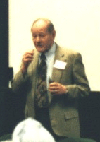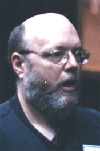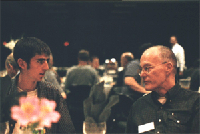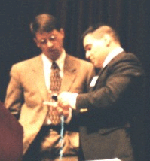“Jeffery Jay Lowder,” I repeat, “L – O – W – D – E – R–no, ‘L’ as in Larry.”‘ The hotel receptionist furrows her brow, clicking furtively on the keyboard and staring at the computer screen.’ “I’m afraid there isn’t a “Lowder” in the database,” she says.’ Flustered, she searches a bit more, scrolling through every person whose last name began with “L” but to no avail.’ I shrug, gather my things and a few minutes later find my room.’ The contrived Kon Tiki motif of the hotel’s exterior gives way to a plasticized colonial room. My walking around kicks up the acrid smell of a chemical cleanser, which hangs in the air and refuses to settle down.’ Outside the large window is an expansive stretch of dense North Carolina woods and a sprawling freeway access road that leads everywhere and nowhere. The phone rings. It is Jeff Lowder.’ His wife had just called the front desk and was apparently more successful at articulating the letter “L” to the receptionist.

Dr. Paul Kurtz (above) speaks to conference attendees.
“I’m working on the debate,” he says. “Come on down to my room and we can talk about things before dinner.”‘ The conference of the Society of Humanist Philosophers would start the next day, on Saturday, September 25, in the Friday Center at the University of North Carolina, Chapel Hill.’ Most attendees were philosophers, except for H. James Birx of Canisius College, an anthropologist, and Victor Stenger of the University of Hawaii, who is a physicist.’ Of the philosophers, Theodore Drange, Keith Parsons, Barbara Forrest, Timothy J. Madigan, Kai Nielsen, Michael Martin, Theodore Schick, Jr., and Paul Kurtz were scheduled to deliver papers.’ Philo’s executive editor Lewis Vaughn was also to deliver a paper. Closing the conference on Sunday afternoon was a debate between Jeff Lowder and Dr. Phil Fernandes of the Institute for Biblical Defense.
Jeff had been preparing for the debate off and on over the previous few weeks.’ “Look at this,” he says while unzipping a large and heavy suitcase that rested at the foot of the bed.’ The suitcase is packed with books.’ Jeff reaches in and pulls out several of them, tossing them down next to the suitcase. “It’s a lot of weight to carry,” he admitted, “but I might still need to reference them before the debate.”‘ Jeff moves over to the desk and to his laptop there.’He swivels it around to reveal his debate speech with which he had been tinkering and revising.’ “How does this part sound?” he asks while reading aloud a portion of the text. We spend some time thinking about various approaches and turns of speech when the phone rings. Someone thought it would be a good idea if everyone went together to the university alumni association’s dinner club. Putting aside the debate preparations, we made our way to the lobby.'”I’ve made a lot of changes,” he said, “so I’ll have to run another printout of the debate speech somewhere.”

Keith Parsons (above) remarked that like the rats of’ Camus’ The Plague, bad arguments resurface after’ 20 or 30 years to infect philosophers’ minds.
The freeway chase
Ten minutes later, after a whirlwind round of introductions, greetings, and reacquaintances, we found ourselves in the back seat of geology professor Steven Schafersman’s beat up four-door sedan. Squeezed between us was Barbara Forrest, professor of philosophy at Southeastern Louisiana University. She was scheduled to deliver a paper on methodological naturalism later in the conference. Edwin Kagin rode up front.’Kagin is the director of Camp Quest, a secular humanist summer camp for kids, and he looked every bit the part.’ From his adventurer’s fedora, rugged beard, and leather vest, Kagin looked like a romantic hero out of a Hemingway novel. In a slow Kentucky drawl, he let loose with the same sort of plainspoken quips that Will Rogers or Teddy Roosevelt might have said. One would never have been able to guess that Kagin is northern Kentucky’s most prominent attorney and a serious contender for a seat on the Kentucky Supreme Court.
The dense Carolina woods whizzed past the window as we talked about religion, philosophy, the rigors of graduate school, the crass politicization of science by creationists, and everything in between. Suddenly we were picking up speed. “Git over in the other lane!” Edwin shouted while pointing up ahead somewhere. “I see him!’ I see him!” Steve shouted back.’ “What’s going on?” Barbara asked. “Paul Humphreys is driving too fast and we can’t keep up,” Edwin hollered over his shoulder without taking his eyes off the highway.’ “We’re supposed to be followin’ him because we don’t know where we’re going.” Up ahead the long black Lincoln Continental sped further ahead, occasionally swerving and changing lanes with no notice.’ Steve grips the wheel as Kagin points and directs. Several times we lose the Lincoln only to see it emerge once more at a crucial turn in the road. We weave through the twisting streets of Chapel Hill and finally arrive at the alumni club. It turned out that someone forgot to tell Humphreys to go slow because we were going to follow him.
Of Barcelona chairs and causal dependence
On Saturday morning we drive to the Friday Center on campus where the conference was held.’ The Friday Center is a typical glass and steel modernist structure that could easily double as a corporate headquarters in a suburban office park. The main doors lead to a cavernous room with facing Barcelona chairs, padded benches, and heavy double doors to large conference rooms.’ Conference attendees are milling about near a long table filled with pastries, bagels, coffee, and juice.’ Others are wandering into an adjacent room and picking out seats near the front. Timothy Madigan, Executive Director of the Council for Secular Humanism at the Center for Inquiry, whose organization sponsored the conference, stood up from a table to welcome everyone. “The conference will have two main themes,” he says, “philosophical naturalism and the anthropic principle.”‘

Jesus Seminar Fellow Robert Price (above)
Philosophical naturalism is the view that everything that exists is spatiotemporal (a part of nature in space and time) and that we can know the natural world around us.’ In the philosophy of religion, philosophical naturalism is opposed to theism (supernaturalism), which posits that there exists a purely spiritual being who is causally independent of the physical world.’ Naturalism is often confused with materialism; the view that there are no purely mental entities but that everything can be reduced to material objects. Naturalism does not entail materialism, however.’ For example, many naturalists hold that consciousness is an emergent and irreducible property of human brain states.’ Often those who make the mistake of confusing naturalism with materialism are beginners only just starting to navigate the muddy waters of philosophical inquiry. The Fellows of the Discovery Institute, an intelligent design think-tank, do know better but sow confusion anyway in order to make sure the beginners stay befuddled.’ (See the story on the Discovery’s “wedge strategy” published in March 1999 as well as NCSE director Molleen Matsumura’s interview on the Secular Web Radio Show.)’
The anthropic principle, recently articulated by John D. Barrow and Frank J. Tipler in The Anthropic Cosmological Principle, states that because we’re here–because human beings exist–then the conditions in the early universe necessary to support life had to be just like they are rather than like something else. If things were like something else, then we wouldn’t be here to talk about how unfortunate it is that those conditions weren’t like they are. For example, if the weak force in the universe were any stronger, then there could have been no beta decay within hydrogen atoms; thus, stars, our sun, the Earth, ice cream, and vapid sit-coms could never have been.’ The anthropic principle is one of those childhood games by which reasonable adults, who should know better, nevertheless become bewitched. Children play the game for fun but do not take it too seriously; for instance, a friend says to another, “wow, if your father hadn’t switched jobs and moved to Topeka in 1968, he would never have met your mother and you wouldn’t even be here!”‘ Among friends such amusements are good clean fun, but counterfactuals become a serious business in the fumbling hands of theologians and philosophers.
Theodore Drange
 After Timothy Madigan’s introduction, Professor Theodore Drange of West Virginia University, stood to deliver a paper entitled “The Fine-Tuning Argument Revisited.”‘ Fine-tuning is the modern theistic evolution of the old design argument.’ Proponents point out that if certain fundamental physical constants in the universe were something other than they are, then the universe would be incapable of supporting life. The argument relies on the anthropic principle to get started.’Drange argued against fine-tuning.’ “We don’t know,” Drange said, “that the particular group of values that exist for the fundamental physical constants of our universe are not the only physically possible values.”‘
After Timothy Madigan’s introduction, Professor Theodore Drange of West Virginia University, stood to deliver a paper entitled “The Fine-Tuning Argument Revisited.”‘ Fine-tuning is the modern theistic evolution of the old design argument.’ Proponents point out that if certain fundamental physical constants in the universe were something other than they are, then the universe would be incapable of supporting life. The argument relies on the anthropic principle to get started.’Drange argued against fine-tuning.’ “We don’t know,” Drange said, “that the particular group of values that exist for the fundamental physical constants of our universe are not the only physically possible values.”‘
Drange pointed out that it might just be a brute fact that the physical constants hold the values that they do. To suggest that the universal constants are improbable, Drange argued, ignores the fact that there could be many separate regions of spacetime, each of which would have its own set of constants. If this were so, then our particular region’s constants would be no great matter.’ They would be one set in a billion and so, given the probability, very likely to occur sooner or later.’ However, even if our universe were the only region of spacetime, Drange argued, the fact that the constants are the way that they are should not surprise us. “Suppose a die were rolled ten times,” Drange said.’ Whatever combination of numbers comes up, that particular combination is both improbable and unique:’ less than one in 60 million.’ “Yet, there is nothing remarkable or surprising about it,” Drange said. “What is needed for the combination to be surprising is that it be somehow very special.”‘ For instance, Drange mentioned that if the die always came up sixes, this would be very special.’ But the mere fact that a combination of numbers is highly improbable, this alone does not lead to design.
Victor Stenger
Victor Stenger, a physics professor at the University of Hawaii, spoke to the anthropic principle from the point of view of modern cosmology.’ “The purported signal of cosmic purpose cannot be demonstrated from the data alone,” Stenger said. Thus to conclude that God designed the universe, Stenger argued, requires a considerable interpretive effort on the part of the theist.’ Further, and most fatal to the design argument, theists are unwarranted in assuming “that only one type of life is possible,” the carbon-based life with which we are familiar.’Stenger calls this view carbocentrism and points out that “sufficient complexity and long life may be the only ingredients needed for a universe to have some form of life.” In the end, Stenger concluded, “the fine-tuning argument rests on the assumption that any form of life is possible only for a very narrow, improbable range of physical parameters. We can safely conclude that this assumption is completely unjustified.”
Stenger also used an analogy of a lottery to illustrate the fallacy of the design argument.’ “Suppose a lottery is conducted in which each entrant is assigned a number from one to one million,” Stenger explained. “Each has kicked in a dollar and the winner gets the whole pot of $1 million.’ The number is selected and you are the lucky winner! Now it is possible that the whole thing was fixed and your mother chose the winning number. But absent any evidence for this, no one has the right to make that accusation.’ Yet that’s what the fine-tuning argument amounts to–without any evidence, God is accused of fixing the lottery.”‘ The point here, Stenger emphasizes, is that someone had to win the lottery. “Similarly,” Stenger said, “if a universe is going to happen, some set of physical constants was going to be selected.’ The physical constants, randomly selected, could have been the ones we have. And they led to the form of life we have.”
Barbara Forrest
 Professor Barbara Forrest of Southeastern Louisiana University, delivered a paper entitled “Methodological Naturalism and Philosophical Naturalism: Clarifying the Connection.” These two forms of naturalism are often misunderstood or (for political reasons) intentionally conflated by proponents of creationism.’ Philosophical naturalism is the view that the natural world is all that exists. It is a metaphysical claim, encompassed in a system that cuts God out of the picture, considering God to be as an unnecessary hypothesis.
Professor Barbara Forrest of Southeastern Louisiana University, delivered a paper entitled “Methodological Naturalism and Philosophical Naturalism: Clarifying the Connection.” These two forms of naturalism are often misunderstood or (for political reasons) intentionally conflated by proponents of creationism.’ Philosophical naturalism is the view that the natural world is all that exists. It is a metaphysical claim, encompassed in a system that cuts God out of the picture, considering God to be as an unnecessary hypothesis.
Methodological naturalism, on the other hand, makes no such claim nor does it promote a metaphysical worldview. It is nothing more than a method–a way of doing science–in which phenomena and data are assumed to be knowable, testable, and ultimately explainable.’ Methodological naturalism is at the heart of science and the main reason that the scientific method works so well.’ For the purposes of doing science, God is bracketed out of the investigation of scientific inquiry. Another way to put this is that God is a “show stopper” for science since to introduce the supernatural as an explanation for the natural is to hinder scientific inquiry. Thus, scientists can be either theists or naturalists. Methodological naturalism has no way to investigate the claim that God exists.’ “It is procedurally impossible to prove the existence of something about which nothing can be known through scientific investigation,” Forrest said.’ Forrest also pointed out that, no matter your personal view of God, methodological naturalism provides an epistemologically stable foundation for metaphysics.
“Methodological naturalism does not provide an exhaustive inventory of what exists and what does not,” Forrest said, “but permits the cumulative gathering and grounding of information about the field we call the natural world, the epistemological boundary of which is its empirical accessibility.”‘ No one can deny, of course, that methodological naturalism has been wildly successful.’ We now understand natural processes and phenomena about the world around us of which our historical forebears could only dream.’ And in this truism is the rub.’ What room is there for God as each bit of his domain is slowly pulled away from him? Or as Forrest put it, “the more of the cosmos which methodological naturalism explains, the less warrant there is for explanations which include the supernatural.” This is the whole gist of the death of God movement in 60s theology and also where Forrest finds grounds for her argument that philosophical naturalism is “the only reasonable metaphysical conclusion” of the successes and outcomes of methodological naturalism.’ Forrest thinks that the successes of science seem to validate the notion of a completely natural world absent of demons, devils, and the supernatural. “As the world of mystery shrinks,” Forrest said, “we are confronted with an asymptotic decrease in the existential possibility of the supernatural to the point at which it is wholly negligible.”

A student of life, Chad Cohen (left) sold his stereo’ to raise the money necessary to attend the conference’ and to meet his long-time hero Michael Martin (right).
Into the wee hours of the morning
Saturday evening, Jeff decided to have a run-through of his opening statement in order to shake out the bugs. He invited several students and a few professors attending the conference to listen and to offer comments and criticisms. After finding an empty banquet room, we pile in and gather about a circular table.’ It’s 8:00 p.m. and everyone looks tired from the day’s activities, yet everyone seems eager to listen.’ Jeff plugs in his laptop, opens it up to his notes, and begins. “I’ve got it all worked out down to the second,” he says, so Eddie Tabash volunteers to time him and see. Several times the presentation is interrupted as people offer comments.’ Deep discussions ensue over definitions; however, these are quickly resolved.’ It was generally agreed that at least one of Jeff’s arguments was fallacious and must be discarded completely.’ Ted Drange rubs his eyes, stands, and excuses himself for the evening.’ We look at our watches.’ The time had flown by.’ It was 11:30 p.m. and there was still much to do.’
Jeff returned to his room, tired and sleepy. “I’ve got to come up with another argument to replace the fallacious one tonight,” he says matter-of-factly while unlocking the door.’ “There will be no time to do it in the morning.”‘ Jeff wastes no time getting set up at the desk. The single lamp emits a pale yellow glow, casting long morbid shadows on the wall.’ Books are scattered everywhere.’ He immediately begins deleting large sections of the opening statement and clears space in his word processing document for new text. It is now midnight. The text insertion tool blinks and waits for further instructions.’

Jeffery Jay Lowder burns the midnight oil’ preparing his speech for the next morning.
“What about this?” Jeff says while typing something on his laptop computer.’ He quickly erases it and starts something else.’ Jeff massages the text, working it like a potter with clay to get it into the form of a sound argument without losing the anecdotal flourishes that audiences need and to which they respond.’ After the long struggle of grappling with words he looks at the time.’ 1:30 a.m. “Not bad at all,” Jeff says triumphantly.’ “Let me just throw this on a floppy disk and then print it up in the hotel’s computer room.”‘ Jeff rummages through his bag.’ Looking concerned he then pulls things from out of his suitcase.’ “Oh no!” he exclaims while looking around the room. “I’ve left my floppy disk drive at home!’ Without it, I can’t print up my notes.”‘ And without the printed notes, Jeff would be forced to ad lib from memory using his old marked-up notes. Finally, he decides to take the laptop computer itself to the computer room and see what we could do. An hour later, after other options fail, Jeff manages to coax the hotel’s laser printer into printing his debate speech.’ We had to get to the conference early the next morning so that left about three or four hours of sleep.
Early the next morning I go to Jeff’s room and knock on the door.’ Jeff was already up. An ironing board was set up, blocking the door.’ Jeff was putting on his suit and gathering together his notes.’ He looked tired.’ “I think I’ll try to grab a few minutes sleep sometime before the debate begins,” he says.
We drive to the Friday Center, grabbing breakfast in the lobby.’ The time had come to get ready for the debate.’ In a last minute debate prep moment, Jeff takes Stephen Schafersman aside to discuss the Precambrian explosion.’ Now he seems to come alive.’ The back and forth, the arguments, facts, counterpoints, and considerations all seem to erase the need for sleep. All at once, Jeff was ready to go.’ In a moment the debate would begin.
The Debate: Lowder’s Opening Statement

Jeffery Jay Lowder (left) and Dr. Phil Fernandes (right)
Jeffery Jay Lowder stood to read his opening statement first.’ He declared that if one were to weigh the evidence for theism against the evidence for naturalism, on balance naturalism is more likely than theism.’ Lowder made use of slides on a screen behind him to illustrate many points during his presentation.
Lowder’s first argument was the physical dependence of the mind on the brain.’ “Certain injuries to or diseases of the brain make it impossible for a person to have any mental states at all,” Lowder argued.’ There is a direct correlation between the mental capacity of animals and the development of neurons in the brain.’ Quoting philosopher Paul Draper, Lowder said that “nothing mental happens without something physical happening.” We should expect this from naturalism, Lowder pointed out, but not from theism where the disembodied mind (the soul) is believed not to be dependent upon the physical. “Therefore,” Lowder concluded, “the physical dependence of minds is unlikely if theism is true.”
Lowder next argued that naturalism better explains the relationship between complex and simple living things. Articulating a long argument for the theory of evolution, Lowder argued that the fossil record, biogeography, and molecular biology are three facts in support of evolution. One example Lowder provided was the fact that humans and chimpanzees are nearly genetically identical, sharing 98% of their genes, including the sorts of pseudogenes of common ancestry that are no longer functional.’ The theory of evolution is compatible with naturalism, Lowder said.’ Of course, “God could have used evolution,” Lowder stated, but “given that 99% of the species that have ever lived on Earth are now extinct, evolution seems like a pretty strange way for an all-powerful being to create living organisms.” Lowder concluded that evolution was better evidence for naturalism than theism.
Lowder’s third argument was that naturalism was the best explanation for the biological role of physical pain and pleasure in animals.’ If faced with the danger and pain of fire, Lowder stated, any of us would avoid it at all costs, increasing our chance of survival.’ “The naturalistic explanation for this is obvious,” Lowder said, “If human beings are the products of evolution by natural selection, we would expect physical pain to aid survival.”‘ Yet, there are instances in which physical pain serve no biological use, he said.’ Going into gruesome detail, Lowder stated forcefully that victims of the Ebola virus suffer horribly before dying.’ It is reasonable for us to question the purpose of needless suffering in a universe created by an all-powerful, loving being.’ “What possible reason,” Lowder asked, could God “have for letting Ebola victims experience such agonizing pain until death?” Naturalism better explains needless suffering–the biological role of pain and pleasure–because it assumes that “evolution is not an intelligent process” imbued with moral purpose. Lowder concluded, “the biological role of pain and pleasure is more likely on naturalism than theism.”
In a related argument, Lowder said that naturalism better explains the flourishing and languishing of sentient beings. “Very few living things have an adequate supply of food and water, are able to reproduce, avoid predators, and remain healthy,” Lowder argued.’ Living things are in fierce competition with each other over limited resources, he pointed out, however, “if naturalistic evolution is true, this is what we would expect.”‘ Citing Paul Draper, Lowder said, “A Darwinian world is inevitably cruel, especially to the young, the old, and the genetically less fortunate.”‘ Contrasting the Darwinian world to theistic creation, Lowder asked, “If theism is true, why would God create a world in which all sentient beings savagely compete with one another for survival?”‘
Lowder’s fifth argument concerned the problem of tragedy in the world.’ He cited an incident during May 1999 in which a church youth group bus crashed, killing six girls and one man.’ “What makes this a tragedy,” Lowder stated, “is that, as far as we can tell, no outweighing good came from this accident.” Under theism, Lowder argued, God could have prevented such a tragedy without taking away anyone’s “free will or our ability to develop moral character.” That God did not and permitted this and millions of other such tragedies to occur renders God morally culpable for states of affairs that he could easily have prevented.’ It is no defense to say that there are reasons beyond our understanding for why God allows tragedies, Lowder stated, because it is also possible that God has reasons beyond our understanding for preventing them. Appeal to mystery is a two-edged sword. “Clearly then,” Lowder concluded, “tragedies are improbable on theism.’ But if naturalism is true, there are no supernatural beings who care about our suffering; thus, we would expect tragedies.”
Lowder’s sixth argument reprises the fifth and suggests that naturalism is the best explanation for God’s silence in the face of tragedies.’ Lowder told a parable in which a parent’s three-year old son has leukemia and faces the struggle of painful chemotherapy, confusion, and fear.’ Although the boy is too young to understand why the chemotherapy is a necessary evil, the parent does everything he or she can to comfort the boy and to remind him at every moment that he is loved. “Just as loving parents would comfort their son while he was fighting leukemia,” Lowder said, “we would expect a loving God to comfort human beings who suffer as the result of tragedies.” However, God is conspicuously absent from the world during times of suffering.’ Even if God had good reasons for allowing suffering as a necessary evil, Lowder argued, “he could still comfort victims of suffering so that they know he loves them.”‘ God is silent when people suffer, which is “not at all what we would expect if theism were true,” Lowder said.’ “However, if naturalism is true, we would expect victims of tragedies not to experience God’s comforting presence for the simple reason that there is no God. Thus, God’s silence in the face of tragedies is much more probable on naturalism than on theism.”
Lowder’s next argument appealed to the variety of religious experience.’ Lowder named four or five of the world’s major religions along with their very different philosophies of worldviews and asked “Why should you choose one religious path over another?”‘ If theism were true, Lowder continued, “we would expect God to clearly reveal his plan for salvation so that there would be no confusion about which religious path to take.”‘ However, Lowder concluded, the fact that religious confusion abounds suggests that there is no God and that religious institutions are man-made attempts to understand the world in which we live.
Lowder’s eight, and last, argument was that naturalism offered the best explanation for the reasonableness of nonbelief. “There are many people, including myself” Lowder admitted, “who don’t believe in God but who wish that some sort of a theistic God did exist.”‘ Yet God’s existence is far from obvious and in fact, nonbelief is very reasonable given the evidence, Lowder said.’ “God is not shy,” Lowder pointed out. “If theism is true, we would expect the existence of God to be obvious.”‘ Yet, God’s conspicuous absence makes atheism a reasonable point of view, which we should expect if naturalism were true and there is no God. Therefore, “reasonable nonbelief is much more likely on naturalism than on theism,” Lowder concluded.
Fernandes’ Opening Statement
After Lowder had finished, Dr. Fernandes stood to read his opening statement.’ The crowd chuckled when Fernandes admitted that he had an idea of what Daniel must have felt like in the lion’s den.’ He argued that his was to be “a cumulative case for [the existence of] God” that would “examine several different aspects of human experience that are more accurately explained by theism, the belief in a personal god, than by naturalism, the rejection of belief in a personal god.”‘ Fernandes defined God as an “eternal uncaused cause of all that exists” who is also intelligent, moral, transcendent, yet immanent, and unlimited.’
Fernandes’ first argument was William Lane Craig’s kalam cosmological argument:’ (1) whatever begins to exist must have a cause; (2) the universe began to exist; therefore (3) the universe must have a cause.’ Just like his mentor before him, Fernandes did not dwell on the first premise, considering it intuitively obvious that “non-being cannot cause being.” Regarding the second premise, Fernandes spent a considerable amount of time defending it. He invoked the Second Law of Thermodynamics, a law that he believes to be objectively real, to argue that the universe could not have existed infinitely because any closed system would have run down and spent its energy long ago.’ “Since the universe is winding down,” Fernandes declared, “it must have been wound up.”‘ As we go back in time about 15 billion years ago, all matter and energy in the universe must have reached an infinite dimensionless singularity.’ Anticipating the quantum vacuum fluctuation challenge to the first premise, Fernandes argued that just because scientists are unable to observe certain causes of subatomic particles this does not entail that there are no causes.’ Fernandes also touched on a few a priori arguments to defend the second premise–for example, Zeno’s paradox of traversing distance–but he did not dwell on them long. Fernandes concluded, “only eternal and uncaused existence can ground the existence of the universe.”
In his second argument, Fernandes pointed out that the presence of human intelligence and moral values presupposes an infinitely intelligent and moral being, namely God.’ “I think we can all agree that there is intelligence in the world, even at this conference,” Fernandes quipped while the audience laughed aloud.’ “Without objective morality,” Fernandes argued, “there would be no such thing as right and wrong”–mere atoms in the void cannot produce moral value. Yet, there are objective moral values; therefore, the cause of them must be an intelligent and moral being. This being, Fernandes pointed out, is what theists mean by God.
Fernandes third argument is what he called the “continuing existence of the universe,” otherwise known as Thomas Aquinas’ “Third Way.”‘ Aquinas argued that it is a fact that there are things in the world caused by other things, all of which need not have existed.’ These contingencies, in fact, all depend upon something else for their existence.’ The universe itself is not necessary, since it might very well have failed to exist; therefore there must have been a necessary being upon which the very universe itself depends upon for its existence.’ Fernandes’ restatement of Aquinas’ Third Way was that “since everything in the universe depends upon something else for its existence, the total set of dependent beings requires independent sustenance for its existence.” This “something” must be independent and unlimited, all-powerful and atemporal since it is the source of the universe.’ In an interesting twist, Fernandes also argued that this uncaused cause must be benevolent, since any trace of evil would entail a limit to its limitlessness. David Hume famously refuted the Third Way by pointing out that just because every member of a collection of dependent beings is dependent upon something else this does not mean that the collection as a whole is dependent upon something else.’ Anticipating this objection, Fernandes stated that “if each part of a floor is made of wood, then we say that the whole floor is wood; likewise, if each part of the universe is dependent, then the whole universe is dependent.”
For his fourth argument, Fernandes invoked the classic design argument.’ “The order, design, and complexity found in the universe strongly implies that the universe was not random chaos or the throwing together of atoms; rather, it is the product of intelligent design,” he stated. “Molecular biologist Michael Behe,” Fernandes said, “has shown that the irreducible complexity found at the molecular level cannot be explained with an atheistic evolutionary model.” Rather than the atheistic notion that molecules just come together by chance, Fernandes argued, irreducible complexity is best explained by intelligent design. As further evidence for intelligent design in the cosmos, Fernandes referred to the anthropic coincidences in which even slight variations of cosmological principles would have rendered life impossible. Citing Christian astrophysicist Hugh Ross, who postulates that there are 25 cosmological principles necessary for life, Fernandes went on to argue that the chance of life evolving from the random shuffling of molecules is “virtually zero.” The odds of life emerging from nonlife, he stated, is about the same as that of a tornado randomly producing a Boeing 747 jetliner from the spare parts laying around in a junkyard.’ “There is no way,” Fernandes continued on a different line, that the sheer volume of information in the human brain “could have been produced by mere chance.’ Intelligent intervention is needed.”‘ Since the universe was intelligently designed, he concluded, “this necessitates the existence of an intelligent designer.”
Reprising his second argument, Fernandes next made an appeal to objective moral law.’ Moral law, Fernandes argued, cannot originate from any one person (or else it would be subjective) yet, “we all make moral judgments when we call the actions of another person wrong.”‘ Appeals to right and wrong cannot be justified in terms of subjective human experience. “We need a moral law qualitatively above Man,” Fernandes argued, “this moral law must be eternal and unchanging so that we can condemn the actions of the past” such as with slavery and the Holocaust.’ Since the moral law is prescriptive, he concluded, a moral lawgiver who is eternal and unchanging must prescribe it.’ This moral lawgiver is God.
Fernandes’ sixth argument was an appeal to the absurdity of life without God.’ “What hope can an atheist offer mankind?” Fernandes asked, “people on their deathbeds usually don’t call an atheist to comfort them. Even if an atheist could guarantee seventy years of happiness, what good would that do compared to the eternity of nonexistence that follows?”‘ Fernandes stressed that life is ultimately meaningless without God. “If there is no God then Hitler will not be punished for his evil deeds and Mother Theresa will not be rewarded for her generous works of charity.’ If there is no God then a million years from now it will make no difference if you were a Hitler or a Mother Theresa.”‘ Fernandes concluded that we need God in order for our life to make sense.’ Evil receives its punishment, good its reward, and life has hope.’ “Without God,” Fernandes concluded, “meaningless existence is all we face.”
Fernandes’ seventh, and last, argument was the failure of naturalism, which turned out to be a summing up of all of his previous arguments.’ “I have shown that naturalism cannot adequately explain the beginning of the universe, its continuing existence, design, the objective existence of moral values, nor can it provide meaning to life,” he stated.’ In addition to these things, Fernandes argued that naturalism cannot account for necessarily existing objects such as the laws of logic and mathematics, free will, and human rights.’ Fernandes concluded that theism is more reasonable than naturalism.
Rebuttals
After the two opening statements, each speaker was allowed two rounds of rebuttals.’ This was followed by a 45 minute question and answer period. Readers interested in the rebuttals and questions and answer period can purchase a videotape of the debate, the instructions of which are at https://infidels.org/infidels/products/video/lowder-fernandes.html.
Disaster at the airport
After the two rounds of rebuttals and the question and answer period, it was time to get Fernandes and Lowder to the airport. Since I had a car, Center for Inquiry’s Anthony Battaglia had asked if I could give them a ride, to which I readily agreed.’ But now everyone had talked so long after the debate that we were running out of time. During the ride to the airport Jeff Lowder, Phil Fernandes, his wife, Barbara Forrest, and I continued the philosophical discussions informally in the car.’ We arrived at the curb, I popped open the trunk and began to unload luggage. “That’s not my suitcase!” Fernandes suddenly exclaimed.’ We all looked at each other in horror.’ It was too late to go back to the hotel since Fernandes would miss his flight. Before anyone could say another word, however, up ran Battaglia, out of breath and lugging Fernandes’ suitcase in his hand.’ “Here, I gotta run, I’m triple parked!” he protested as he quickly handed it to Fernandes, waved his goodbyes, and disappeared back into the crowd. Greatly relieved, we all shook hands, warmly hugged each other, and I watched as Fernandes, his wife, Lowder, and Forrest hurried into the terminal.’ It was a rare and fleeting moment.’ I smiled and thought of a million things at once: how little we all really know even as we pretend to know much, the curiosity that binds us together, and the great potential we humans have for creating meaning out of chaos.’ As I stood there, a whistle blew for the third time and I finally saw the traffic policeman who had been pointing at me. I smiled and waved, hopped in the car, and drove off.



